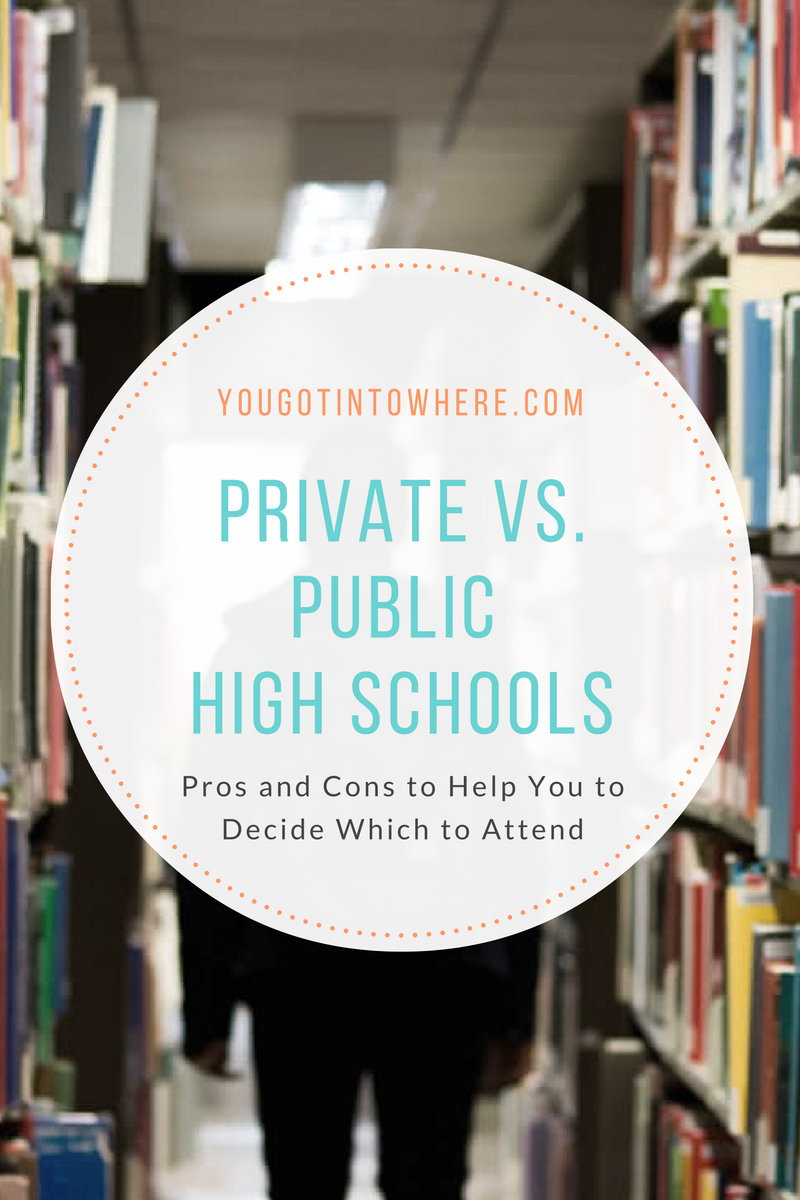Choosing to Attend a Private Versus Public High School
/Private vs Public. This has been a debate that has been taking place from the beginning of the rise of the educational system that has been present in our country since the early 1900s. What once was a one-for-all education in a town schoolhouse, turned into the formation of city and state funded public schools, which led many parents to consider an alternative education experience to what their city provides- private school. Now I am a self-proclaimed, ‘’private school girl”. However, it wasn’t always that way, because I was fortunate enough to attend two of my city’s three magnet schools while at the elementary level. Once time for middle school came around, rumors of my city’s ‘’bad’’ middle and high schools broke out. I heard about gangs, drugs, and bullying worse than what I was currently experiencing in elementary school. My brother had attended private school all of his life, while I, thinking private school, is ‘wack’, decided to stay enrolled in the public school system until I graduated elementary and then switch for middle and high school.
This September marked six years since I have been enrolled in private school, and I’m proud to say that I feel, my parents and I have made the right choice. Many people felt uneasy upon hearing my desire to leave public school, with declaring statements such as ‘’it’s a waste of money’, or that it wouldn’t benefit me any more than public school did. They also marvel at the fact that I wake up earlier than most teens do, just to be able to travel from my home in suburban New York, (Westchester County), and into the hustle and bustle in Manhattan (where my school is located). As I have previously stated, I personally have discovered that private school is the right fit for me, and I have written this article to dispel any myths that may stand in the way of deciding between the two.

MYTH #1: Private School children are rich and arrogant
Now this is just a hasty generalization (yes, and ode to AP English!). As always, there are plenty of shows, one example being Gossip Girl, which show private school to be a haven for the wealthy and social elites. Do not be fooled by this-- many individuals who attend private schools are scholarship students, meaning that they really can’t afford to be there. I, for, one am a scholarship student. Upon graduating from middle school, my parents, who were having financial issues, did not know whether I would be able to continue in private school or not. Luckily, I was contacted by my current high school and I received a scholarship that has been a big help to my family financially.
Don’t be blinded by the hype of the media. Private school students are just like every other kid, most aren’t rich or ‘’privileged’’, but have just chosen that particular educational route.
MYTH #2: All Private Schools wear uniform
Although most private schools do wear uniform, many do not. There are Montessori Schools, and other independent schools that do not place a uniform requirement on your schooling. If you are someone with a passion for fashion, who thrives on other’s compliments of their outfits, accessories, e.t.c., then private school can still be an option. Some have a uniform that is optional but not mandatory; others have mandatory uniforms, while others have no uniform at all. Never let a fear of uniform influence your high school decision, because uniform isn’t even a factor in some private schools.

MYTH #3: Private school is ‘’harder’’ than public school (or more academically rigorous)
This myth is completely subjective. Yes, some private schools can be more academically challenging than public schools, but this isn’t a one-size-fits-all deal. Not all private schools are rigorous, or better academically, than a public school. I wouldn’t advise anyone to weigh the academic rigor of a high school, or any school, based on whether its public or not. The amount of academic rigor that a school has in its curriculum is unique to every school. Some schools have numerous AP courses, other schools have very few. Some promote the IB diploma, while others recommend dual enrollment. Beyond the private and public school spheres, there are many different types of high schools, all which vary in rigor. Some are rigorous, others aren’t. A private school isn’t necessarily more rigorous than public school, and vice versa.
MYTH #4: Private School student are ‘’disadvantaged’’ when it comes to college admissions
Now this is just one big lie. This is a lie that almost stopped me from applying to the private high school that I currently attend now. While in eighth grade, I was told that top ranked colleges (Ivies, Stanford, and such), do not admit private school kids, that they prefer those who make do with what they have been given, which is the reason why they are said to ‘’prefer’’ public school students.
There are plenty of great public schools, but my city just doesn’t have them. My deciding on attending private school was influenced by my strong desire to learn, which I felt would be put to use in classes with smaller class sizes.
I knew I wanted to attend private school, but I had thought that I ruined my chance at top college admission because of it. Little did I know, there have been the occasional alumni of my school that have went on to attend prestigious institutions such as Harvard and Columbia. It is extremely rare, but it does happen.
College admissions are based on a holistic review, meaning that they take everything into account, starting with the high school you attended. Do not fear, colleges aren’t looking to expel public school applicants, admit private, or vice versa, they are looking for a diverse class, filled with students from all walks of life. Going to a public or private high school will not be an advantage or disadvantage when pertaining to college admissions.

IS PRIVATE SCHOOL RIGHT FOR ME?
Now we have come to the end of our article, the point where you decide if a private or public school education is right for you. Whether you are looking to start high school or college, here are some factors to consider when deciding to take the private vs public school route.
A. Can I survive in a large school?
Private schools tend to be small, while some public schools house as many as 5,000 students. If you hate the impersonal feeling of a large school and thrive in a more intimate environment, then private school may be a viable choice for you.
B. What class size suits me best?
Some people thrive on lecture style classes, and can still stay in tune with a professor despite being surrounded by a large group of students. Others prefer a smaller, more intimate, classroom setting, one open for discussion and comments on observations.
C. Is religious education important to me?
Many private schools enforce religion into the curriculum, public schools do not. Is religion important to you? Would you like to be surrounded by students and teachers who share your faith/religious beliefs?
Those are all things to think when considering any school, whether private or public. I hope this article can get you one step closer to making your choice.
WANT TO LEARN MORE ABOUT COLLEGE ADMISSIONS? CHECK OUT THE YGITW BOOK HERE!
LOOKING FOR A HIGH SCHOOL OR COLLEGE INTERNSHIP? APPLY HERE!
PHOTO CREDITS:
http://3.bp.blogspot.com/
https://s-media-cache-ak0.pinimg.com
http://nicoleleiren.com/














